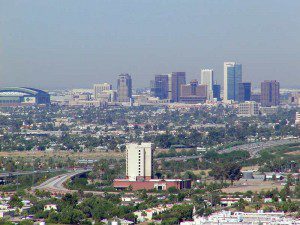
(Wikimedia Commons; click to enlarge)
Nathaniel Hancock has brought the following unpleasant item to my notice, along the way ruefully mentioning the famous comment from John Adams that “Our Constitution was made only for a moral and religious people. It is wholly inadequate to the government of any other”:
Alas, I tend to agree with the majority on the Phoenix City Council that they had no other choice if they wanted to avoid an expensive court battle — a battle that, in today’s legal climate, they might well end up losing anyway.
I also agree with at least some who voted in the minority, who denounce this decision as a victory for the Satanists.
The effort by members of the Satanic temple is, in my judgment, very plainly aimed largely if not solely at denigrating religious faith and at proselytizing. (I’m very deliberately echoing the language of their lawyer, Gregory Lippert, as cited in the article.) Few if any of them actually believe in either God or Satan, and they cannot, therefore, really believe in the “invocation” of a deity whom they don’t believe to exist.
I understand that many public prayers already verge perilously close to orations aimed at their earthly audiences rather than preserving the character of appeals to God (or, even, the Gods). But, given the Satanists’ ideology, a Satanist prayer cannot be anything other than a speech aimed at advancing their point of view or, at the least, denigrating, mocking, or deliberately contradicting other religious beliefs. That wouldn’t necessarily be true of a Catholic, Protestant, Mormon, Jewish, Muslim, or Hindu prayer, but it would, I think, unavoidably be true of a Satanist “prayer.” The very notion of such a “prayer” mocks the prayers of legitimate religious believers.
Altogether, this is a sad but unsurprising little landmark in the history of American civil religion.










